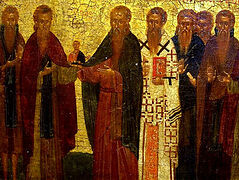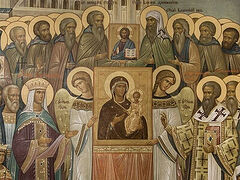What does it mean that the anathemas now proclaimed by the Church all fall upon sophistries and heresies, while not a single one strikes impiety and vice? Is an impious life really less repugnant to the Gospel than a false faith? No, unrepentant vice is even more felonious than obstinate unbelief. If it’s not being struck by anathemas now, it’s because there’s never been a dispute about its criminality; for everyone, both Orthodox and heretics themselves, have always unanimously recognized that a lawless and impious life is in and of itself already anathema.
Is not this enough to strike every unrepentant sinner with shame and horror? But to make this saving fear stronger and more real, let us open the Holy Scriptures and read there those passages uttering grief and a curse on sin and vices.
Let us listen, first, to the leader of the people of God, the Sinai lawgiver Moses. According to the Word of God, he was very meek, above all the men which were upon the face of the earth (Num. 12:3). What does this meekness say to sinners? Cursed is the man that dishonours his father or his mother: and all the people shall say, So be it. Cursed is he that removes his neighbour's landmarks... Cursed is he that makes the blind to wander in the way… Cursed is every one that shall pervert the judgment of the stranger, and orphan, and widow… Cursed is he that smites his neighbour secretly… Cursed is he whosoever shall have taken a bribe to slay an innocent man… Cursed is every man that continues not in all the words of this law to do them: and all the people shall say, So be it (Deut. 27:16-19, 24-26). This is what Moses says in another place, or rather, what the Lord Himself says by his lips, to all the people of Israel: But it shall come to pass, if thou wilt not hearken to the voice of the Lord thy God, to observe all His commandments, as many as I charge thee this day, then all these curses shall come on thee, and overtake thee. Cursed shalt thou be in the city, and cursed shalt thou be in the field. Cursed shall be thy barns and thy stores. Cursed shall be the offspring of thy body, and the fruits of thy land, the herds of thine oxen, and the flocks of thy sheep. Cursed shalt thou be in thy coming in, and cursed shalt thou be in thy going out (Deut. 28:15-19).
See how many anathemas and what they’re for? Not for heresies and schism, but for violating the law of God, for a life of unrepentant sins.
But perhaps such strictness against vice was a property of the Old Testament alone, which in accordance with its strict inner character was given on Mt. Sinai amidst thunderstorms and lightning. Perhaps the New Testament, as the covenant of mercy and grace, contains less horror and fear for the unrepentant sinner, such that, with hope in the merits of Christ, you can carelessly indulge in your lusts and passions for the rest of your life?
But, my brethren, wouldn’t thinking in this way mean not understanding, debasing, and offending the venerable grace of God, and according to the terrible expression of the Apostle of Christ, turning it into lasciviousness (Jud. 1:4)? For we shall say together with St. Paul: Is therefore Christ the minister of sin? God forbid! (Gal. 2:17). But if in the New Testament, where sin abounded, grace did much more abound (Rom. 5:20), it’s not so as to nourish and strengthen lawlessness in man with this abundance, but to suppress it, blot it out, and abolish it. The blood of Jesus Christ cleanses and saves from sin—but whom? Not every sinner, but only those who, contrite over their sins and receiving forgiveness for them in the name of the Redeemer, use all means to liberate themselves from the shameful captivity of the passions. For unrepentant sinners, there is neither grace nor mercy in the New, just as in the Old Testament.
That these terrible truths might not seem to anyone to be our own reasoning, let us turn again to Scripture, and listen to what is said in the New Testament against vice. Woe unto you, scribes and Pharisees, hypocrites! for ye pay tithe of mint and anise and cummin, and have omitted the weightier matters of the law, judgment, mercy, and faith! (Mt. 23:23). Here is an anathema against false piety! Woe unto you, scribes and Pharisees, hypocrites! for ye are like unto whited sepulchres, which indeed appear beautiful outward, but are within full of dead men's bones, and of all uncleanness! (Mt. 23:27). Here a judgment over hypocrisy! Woe … for it must needs be that offences come… it were better for [a man by whom offences come] that a millstone were hanged about his neck, and that he were drowned in the depth of the sea (Mt. 18:7, 6). An anathema to those who tempt! Woe unto you that are rich! for ye have received your consolation! Here a judgment on the unrighteous rich and the hard-hearted! Woe unto you that are full! for ye shall hunger! Here a verdict against the sons of luxury and abundance! Woe unto you that laugh now! for ye shall mourn and weep! Here thunder against the insane joys of the world! Woe unto you, when all men shall speak well of you! (Lk. 6:24-26). Here a shot against vainglory and the vain praise of men!
You see with what force and severity even what according to the judgment of the world isn’t regarded as vice, but is sometimes honored as virtue, is struck in the New Testament. And from whose mouths come so many woes and condemnations? From the mouth of the sweetest Jesus, from the mouth of Him Who Himself is the sole source and giver of all grace. Would He utter unnecessary woes?
Would you like to hear what else the Apostle Paul says about sinners—the Apostle who was so full of love for others that he desired to himself be cut off from Christ for the sake of the salvation of his lost brethren? St. Paul smites with anathema not only obvious vice and obvious unrepentance, but also coldness towards faith, the lack of a heartfelt disposition and love for our Lord and Savior. If any man love not the Lord Jesus Christ, he says, let him be anathema (1 Cor. 16:22).
After this, what sin or vice will be free from anathema? For does that pastor who serves at the altar only because he feeds from the altar, while neglecting the salvation of those entrusted to him, love the Lord Jesus? Thus, he is under the Pauline anathema! Does that judge who values bribes and partiality over truth and innocence at court love the Lord Jesus? Thus, he is under the Pauline anathema! Does that ruler who squanders the bloody labors of his subjects on luxury for himself and his personal whims love the Lord Jesus? Thus, he is under the Pauline anathema! Does that rich man who, having every possibility to ease the fate of his and Christ’s lesser brethren, cruelly shutteth up his bowels (1 Jn. 3:17) at the sight of a brother in need love the Lord Jesus? Thus, he is under the Pauline anathema! Does that father who takes no care for the upbringing of his children and gives them a bad example care for the Lord Jesus? Or a spouse who doesn’t observe mutual fidelity and doesn’t bear with mutual shortcomings? Children who don’t render respect to their parents and elders? Do all the intemperate, all the angry, all the calumnious, all the proud, all the sinners love the Lord Jesus? Thus, they are all under anathema, for If any man love not the Lord Jesus Christ, he is, according to St. Paul anathema! (1 Cor. 16:22). So what can we promise to such unrepentant souls? Can they really be promised Paradise and beatitude in Heaven?
Some may say: This is a hard saying (Jn. 6:60). But for whom is it hard? For those who don’t love Him Who Himself is all love; Him Who died for our sins and rose again for our justification. And what remains for such people, if not judgment and condemnation of their sins? For whom is this a hard word? For those who have clung to the temptations of the world to such an extent that they have drowned out the voice of conscience and law in themselves, and have decided, apparently, to continue an impure and God-defying life forever.
Let us rather thank the Lord that the terrible fate awaiting sinners isn’t hidden from us, and that what will befall us beyond the grave, if we do not repent, is clearly shown to us. If the love of Heaven itself roars over us with the thunder of anathema, it is to arouse us from the mortal sleep of sin.
Let us be grateful for this care over us, and upon returning home, instead of talking idly about how the anathemas were proclaimed in church, let us examine whether something in our morals and our lives is subject to anathema. And if we find any such thing, let us make haste to eliminate it from ourselves, no matter how good and precious it may seem to us so that we won’t fall in the end under this terrible anathema, from which there will no longer be salvation in repentance and the merits of Christ. Amen.




